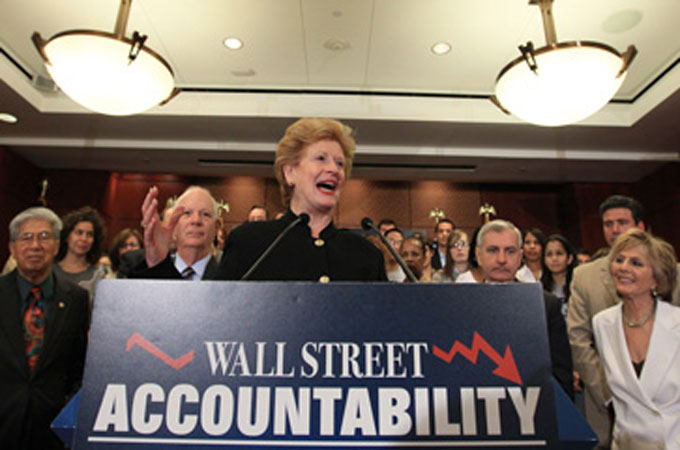US economy comeback, false advertisement
A dip in the unemployment rate should not be seen as an indication of financial recovery in the US, analyst says.

 |
|
Wealth among Wall Street executives is so concentrated that 25 hedge fund managers pocketed a total of $22.07 billion, the New York Times reported [AFP] |
The AFL-CIO noted while the administration was celebrating a downtick in unemployment:
|
While the official unemployment rate is 8.8 per cent, its 15.7 per cent of unemployed, underemployed and those who have given up looking for work included more than 24 million people. Young people and people of colour continue to experience the worst jobless rates which have remained high, with 24.5 per cent of teenagers out of work and 15.5 per cent of black workers and 11.3 per cent of Hispanics jobless. Some 7.9 per cent of white workers are jobless, as are 7.1 per cent of Asian workers. |
At the same time, better paid government jobs are being chopped, leaving workers in low wage private sector employment paying less money for more work. Foreclosures are up even as bank profits (and CEO salaries) soar.
We are just learning the full extent of the Federal Reserve Banks loans to banks the world over, while a promised crackdown on fraud has yet to come. A bailout costing trillions was kept secret until a reporter’s lawsuit just forced a disclosure.
Still hidden is the role government plays in manipulating markets or pumping them up through the Plunge Protection Team, a shadowy agency I discuss in more detail in my book, The Crime of Our Time.
Wall Street’s “swinging dicks”, as they are called are back in the saddle. They have neutered financial reform and have silenced the president, who seems to want to cheer up the people rather than inform them about what is really going on, as food and gas prices rise while inflation begins to rear its ugly head.
Veteran investor Jim Rogers told the Daily Bell:
|
It is already happening; prices are going higher. Now the blame game starts and the government will blame it on draught or crop failure or whatever. Politicians will do and say anything to avoid explaining that inflation is a monetary problem. Their reactions are always the same and it is always astonishing to me. |
As president Ford said, “there is no problem” – and “even if there is, it is not his problem. Well there are always people who are in denial; then the problem gets worse not better.”
Wall Street’s hedge funds are having a field day. The New York Times reports that wealth among executives in that part of the financial labyrinth is so concentrated that 25 hedge fund managers “pocketed a total of $22.07 billion. At $50,000 a year, it would take the salaries of 441,000 Americans to match the sum.”
Who is speaking out against this? With bi-partisan silence on the issue, it seems the Beltway is more than comfortable with the current situation.
Wall Street is stronger than ever. Its “reforms” are proving to be a joke. No big executives who profited from pervasive mortgage fraud have gone to jail as prosecutions dwindle.
There has been a respite in Wisconsin as a state judge shoots down the GOP’s attempt to outlaw collective bargaining but similar laws have passed in Ohio and New Hampshire.
Challenging false promises of globalisation
In a globalised world, we are all interdependent. What happens to one part of this world affects us all. That is why we have to pay attention to the falling economic dominoes in Europe where Portugal may be next to go with Spain and Ireland not far behind.
So far protests by hundreds of thousands in Britain have not dented much less changed the government’s cutbacks in the name of austerity. Serious critics may have the facts on their side but are still being marginalised, pushing nuanced discourse out of the mainstream.
Journalist Chris Hedges was honoured when he wrote for the New York Times. When he left, and was finally able to speak his own mind, he began challenging the false promises of globalisation.
He writes:
|
The refusal by all of our liberal institutions, including the press, universities, labour and the democratic party, to challenge the utopian assumptions that the marketplace should determine human behaviour permits corporations and investment firms to continue their assault, including speculating on commodities to drive up food prices. It permits coal, oil and natural gas corporations to stymie alternative energy and emit deadly levels of greenhouse gases. It permits agri-businesses to divert corn and soybeans to ethanol production and crush systems of local, sustainable agriculture. It permits the war industry to drain half of all state expenditures, generate trillions in deficits, and profit from conflicts in the Middle East we have no chance of winning. It permits corporations to evade the most basic controls and regulations to cement into place a global neo-feudalism. The last people who should be in charge of our food supply or our social and political life, not to mention the welfare of sick children, are corporate capitalists and Wall Street speculators. |
So once again, a gauntlet has been thrown down, but so far activists, advocates, unions and even progressive journalists stay submerged in fighting partisan wars and are not taking on the deeper fight for economic justice.
If we want to walk in the footsteps of giants, we need to broaden our understanding of the scale of what needs changing and target the banksters on Wall Street as well as Republican politicians that do their biding.
Danny Schechter edits Mediachannel.org. His new film, Plunder: The Crime of Our Time, tells the story of the financial crisis as a criminal tale. He can be reached at: dissector@mediachannel.org
The views expressed in this article are the author’s own and do not necessarily reflect Al Jazeera’s editorial policy.
